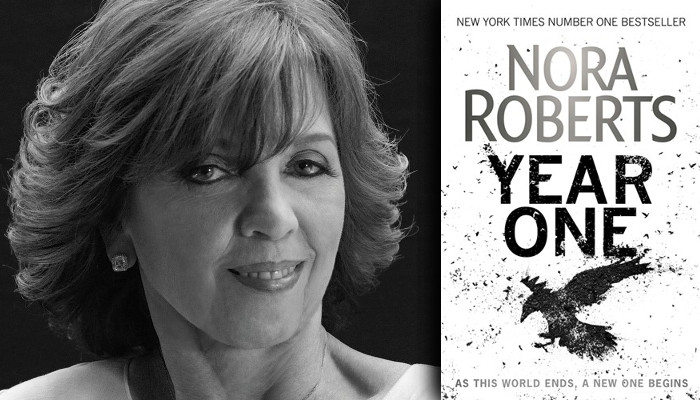Nora Roberts turns to dystopian sci-fi with her new book Year One, the first of a trilogy
More about the book!

From number one New York Times bestseller Nora Roberts comes Year One – an epic, apocalyptic tale of good and evil, love and loss.
With one drop of blood, the old world is gone forever. And in its place, something extraordinary begins…
They call it The Doom – a deadly pandemic that starts on a cold New Year’s Eve in the Scottish countryside. There’s something mysterious about the virus and the way it spreads. As billions fall sick and die, some survivors find themselves invested with strange, unexpected abilities.
Click on the link above for more about the book!
Read an excerpt from Year One:
CHAPTER ONE
— Dumfries, Scotland —
When Ross MacLeod pulled the trigger and brought down the pheasant, he had no way of knowing he’d killed himself. And billions of others.
On a cold, damp day, the last day of what would be his last year, he hunted with his brother and cousin, walking the crackling, frosted field under skies of washed-out, winter blue. He felt healthy and fit, a man of sixty-four who hit the gym three times a week, and had a passion for golf (reflected in a handicap of nine).
With his twin brother, Rob, he’d built—and continued to run—a successful marketing firm based in New York and London. His wife of thirty-nine years, along with Rob’s and their cousin Hugh’s wives, stayed back, tucked into the charming old farmhouse.
With fires snapping in stone hearths, the kettle always on the boil, the women chose to cook and bake and fuss over the coming New Year’s Eve party.
They happily passed on tromping the fields in their wellies.
The MacLeod farm, passed from father to son for more than two hundred years, spread for more than eighty hectares. Hugh loved it nearly as much as he did his wife, children, and grandchildren. From the field they crossed, distant hills rose in the east. And not that far a cry to the west rolled the Irish Sea.
The brothers and their families often traveled together, but this annual trip to the farm remained a highlight for all. As boys they’d often spent a month in the summer on the farm, running across the fields with Hugh and his brother, Duncan—dead now from the soldier’s life he’d chosen. Ross and Rob, the city boys, had always thrown themselves into the farm chores assigned by their Uncle Jamie and Aunt Bess.
They’d learned to fish, to hunt, to feed chickens, and to gather eggs. They’d roamed, forests and fields, on foot and on horseback.
Often, on dark nights, they’d crept out of the house to hike to the very field they walked now, to hold secret meetings and try to raise the spirits within the little stone circle the locals called sgiath de solas, shield of light.
They’d never succeeded, nor had they ever chased down the haints or faeries young boys knew traveled the forests. Though on one midnight adventure, when even the air held its breath, Ross swore he’d felt a dark presence, heard its rustling wings, even smelled its foul breath.
Felt—he would always claim—that breath blow into him.
In adolescent panic, he’d stumbled in his rush to flee the circle, and scraped the heel of his hand on a stone within.
A single drop of his blood struck the ground.
As grown men, they still laughed and teased over that long-ago night, and treasured the memories.
And as grown men, they had brought their wives, then their children, back to the farm on an annual pilgrimage beginning on Boxing Day and ending on the second of January.
Their sons and their sons’ wives had left only that morning for London, where they would all see in the New Year with friends—and spend another few days on business. Only Ross’s daughter, Katie, who was seven months along with twins of her own, had stayed back in New York.
She planned a welcome-home dinner for her parents that was never to be.
But on that bracing last day of the year, Ross MacLeod felt as fit and joyful as the boy he’d been. He wondered at the quick shiver down his spine, at the crows circling and calling over the stone circle. But even as he shook it away, the cock pheasant, a flurry of color against the pale sky, rose in flight.
He lifted the twelve-gauge his uncle had given him for his sixteenth birthday, followed the bird’s flight.
It might be that the heel of the hand he’d scraped more than fifty years before stung for an instant, throbbed an instant more.
But still …
He pulled the trigger.
Categories Fiction International
